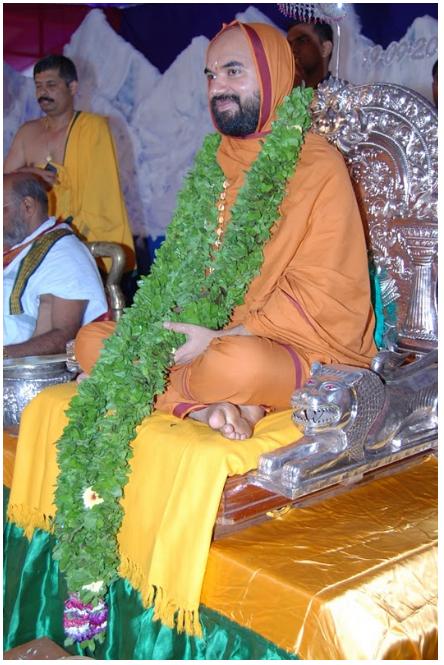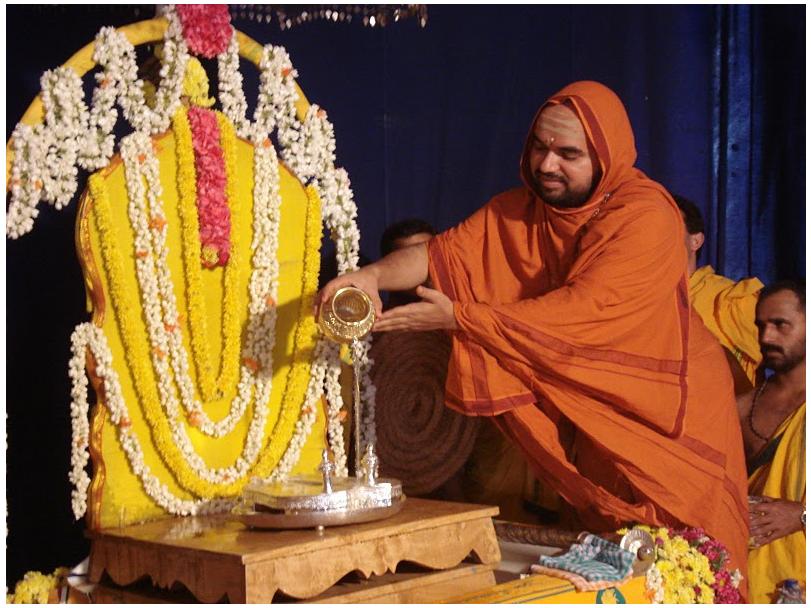This is an episode in the life of Shankaracharya who spread
the message of Vedânta all over India. He traveled widely in
the mission of propagating jnâna and dharma. During his
travels he reached Kashmir, which was a seat of learning.
There he met Mandana Mishra, a scholar of great repute.
Mandana Mishra belonged to the Mimamsa school of
thought, which held the view that rituals and work are superior
to jnâna. Shankaracharya believed in the supremacy of jnâna.
A debate was arranged between the two scholars to decide
the issue.
An interesting condition was laid down to decide the winner.
At the beginning of the debate a garland each was to be placed
around the necks of the scholars. The one whose garland faded
first would have to accept defeat and serve the other. Both
accepted the condition and the debate began.
The scholars argued impressively. It looked as if Mandana
Mishra’s karma school of theory was about to win. Suddenly
there was a reversal of events and the garland around
Mandana Mishra’s neck faded. Shankaracharya won the
debate. As per the condition, Mandana Mishra took a new
name, Sureshwaracharya and became the disciple of Shankara.
When we listen to this story, two questions arise in our minds.
What is the connection between the result of the debate and
the fading of the garland?
When both the garlands were worn at the same time and the
climate being the same, how could one of them fade faster?
The great yogi, Shree Ranga Mahaswamiji of Mysore offers
the following explanation.
While Mandana Mishra argued for his personal victory,
Shankara argued for the victory of an ideology. Mandana
Mishra argued to defend his position as the undisputable
scholar but Shankara wanted to place before the world, the
truth he had realized.
When Mandana Mishra feared that he was going to lose the
debate, his body became hot and the garland faded.
Shankaracharya debated fearlessly for the cause of truth.
His body and mind were cool and the flowers did not fade.
There are three types of debate. Vâda is a conversation
between two people to gain knowledge; it is of sâthvik nature.
Jalva is an argument with an intention of conquering others;
it is of rajas nature. Vithanda is condemnation of others’
argument without declaring one’s stand; it is thâmasic.
Let the goal of all our debates be to gain jnâna. Then the
garland of life will never fade.



June 2, 2011 at 9:48 AM
Oh Sadguru! Please give me courage to argue for truth…
June 12, 2011 at 1:37 PM
ಸತ್ಯವಿದ್ದಲ್ಲಿ ಧೈರ್ಯವಿರಲೇಬೇಕು…
ಸತ್ಯದ ನಿತ್ಯಸಂಗಾತಿಯದು..ಧೈರ್ಯವೆಂದರೆ..
June 2, 2011 at 12:09 PM
Sashtanga Namaskara to Shri Adi Shankaracharya, who lived life for spreading Dharma.
June 2, 2011 at 3:11 PM
🙂
June 2, 2011 at 6:59 PM
The spiritual wind is like life itself,
for it contains only good.
Possessing such power and might,
Guruji relieve us of bad.
Let us roam around his left and right
for that make us only good,
but for now,he guides the path that right
for that take us near the god.
with the gentle breeze flowing from greate Yogi,
creating music to our ears,
with his blessings,warmth and cool
taking away always all our fears.
June 12, 2011 at 1:35 PM
ಅನ್ಯಭಾಷೆ…
ಅನನ್ಯ ಸಂಸ್ಕಾರ..!
June 3, 2011 at 11:21 AM
ಹರೇರಾಮ,
ಜೀವನದ ಕಷ್ಟಗಳಿಗೆ ತ೦ಪಾಗಿ
ಜೀವದ ಬಾಷೆಗೆ ಇ೦ಪಾಗಿ
ದೇವನೇಡಗೆ ಸೊ೦ಪಾಗಿ
ಬೆಡುವೆನು ನಾ ತಲೆ ಬಾಗಿ
June 4, 2011 at 6:07 PM
“तत्वमसि।” ಎಂಬ ವಾಕ್ಯವನ್ನು ಜನತೆಗೆ ಸಾರಿಹೇಳಿದ ಶ್ರೀಶಂಕರಾಚಾರ್ಯರಿಗೆ,ಹಾಗೂ ಶಂಕರ ಜ್ಞಾನದೀವಿಗೆಯನ್ನು ಪಸರಿಸುತ್ತಿರುವ ಶ್ರೀಶ್ರೀಗಳಿಗೆ ಅನಂತ ನಮನಗಳು…
ವಿತಂಡ,ಜಲ್ಪಗಳು ನಮ್ಮಿಂದ ದೂರವಾಗಿ, ಜಿಜ್ಝಾಸುಗಳಾಗುವಂತೆ ನಮ್ಮನ್ನು ಹರಸುವಂತೆ ಶ್ರೀಶ್ರೀಗಳಲ್ಲಿ ಪ್ರಾರ್ಥನೆ…..
June 12, 2011 at 1:34 PM
ವಿತಂಡ,ಜಲ್ಪಗಳು ಅಜ್ಞಾನದ ಅನ್ಯರೂಪಗಳೇ..
‘ಹೋದೆಯಾ ಪಿಶಾಚಿಯೇ ಎಂದರೆ ಬಂದೆ ಗವಾಕ್ಷಿಯಲ್ಲಿ’ ಎಂದಂತೆ..
June 12, 2011 at 2:14 PM
‘ಗು’ಕಾರಸ್ತು ಅಂಧಕಾರಃ। ‘ರು’ಕಾರಸ್ತನ್ನಿರೋಧಕಃ॥
ಅಂಧಕಾರ ನಿರೋದೇನ। ಗುರುರಿತ್ಯಭಿಧೀಯತೇ॥
ಇರುವ ಅಂಧಕಾರ ತೊಲಗಿ,ಅದು ಮತ್ತೆ ನಮ್ಮನ್ನಾವರಿಸದಂತೆ ‘ಗುರುರಕ್ಷೆ’ಯಾಗಲಿ..